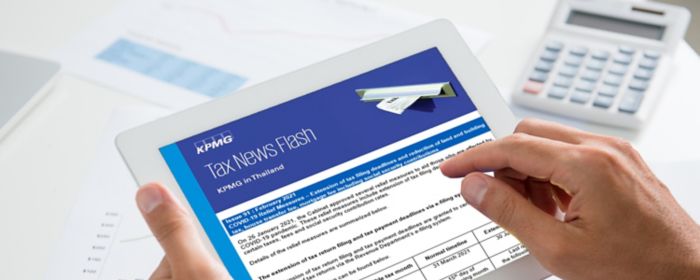e-Service Tax Law Enacted to Collect VAT on Electronic Services
On 9 February 2021, Thailand enacted the Act Amending the Revenue Code No. 53 B.E. 2564 (2021) (“e-Service Tax Law”) in order to collect value added tax (“VAT”) from foreign electronic service providers who provide services to non-VAT registrants in Thailand. The e-Service Tax Law was published in the Royal Gazette on the 10th February 2021 and came into effect the following day.
The provisions concerning VAT payments and remittance will be enforced for income received or payments made from 1 September 2021. This means that tax filing obligations will commence from the tax month of September 2021 onwards with the first deadline falling on the 25th October.
The e-Service Tax Law remains unchanged from the latest draft issued in January 2020. In a nutshell, under the e-Service Tax Law:
- A foreign company that provides electronic services to a non-VAT registered person (this would typically include individual consumers but may also include small unregistered businesses) will be required to register for VAT in Thailand, subject to meeting the revenue threshold of THB 1.8 million from the provision of such services.
- Where a foreign company provides services, receives payments and delivers the services through an electronic platform, the electronic platform owner has an obligation to register for and pay VAT on behalf of all foreign companies that use its platform in the above manner. The platform owner is required to register for VAT once and pay the combined output VAT for all relevant foreign companies.
- The registered foreign company or platform will have an obligation to remit output VAT to the Revenue Department. No input VAT offset is allowed.
- There is no requirement to issue a tax invoice.
- VAT returns must be filed, and tax payments made on a monthly basis. The deadline for filing and payment is the 23rd day of the following month.
- Some of the key definitions are:
o Intangible property transferred via an electronic network is excluded from the definition of “goods”.
o “Electronic service” means a service, including intangible property, delivered through internet network or any other electronic network with substantially automatic nature and such service cannot be provided without information technology.
o “Electronic platform” includes markets, channels or any other methods that several service providers use to provide electronic services to service recipients.
- Where a Thai VAT registrant pays service fee to a foreign company providing electronic services, the VAT registrant is required to self-assess VAT on such service fee and remit VAT to the Revenue Department. For the avoidance of doubt, the e-Service Tax Law clarifies that, in these circumstances, the foreign company is not required to register for VAT in Thailand.
On its Facebook page, the Revenue Department provides examples (in Thai language) of electronic services that fall under the e-Service Tax Law to include online downloading of games, music or movies; stickers sold in chat applications; streaming services; and advertising services on webspace or applications.
The Revenue Department also provided examples of the affected “electronic platforms” to include Apple, Google, Facebook, YouTube, Line, Joox, Netflix and TikTok.
VAT registration, tax return filings and payments will be administered via a Simplified VAT System for e-Service (“SVE”), which is currently being developed by the Revenue Department. Earlier this year, the Revenue Department sought feedback from selected stakeholders on the user interface and various reporting requirements under the proposed SVE. The general observation from the participating stakeholders was that, as currently designed, the SVE requires a greater level of information than what is recommended in the OECD’s International VAT/GST Guidelines and implemented in other countries in Asia-Pacific.
Affected companies are urged to assess their presence in Thailand and whether various electronic services or products offered to Thai users may be subject to the e-Service Tax Law. Whilst guidelines and/or supplementary regulations providing further clarity on the legislation and compliance system may be issued in advance of the 1 September enforcement deadline, the expected timing has not been officially confirmed. Taxpayers should allow sufficient time to assess the impact of the new rules and their systems readiness for the upcoming compliance.
Connect with us
- Find office locations kpmg.findOfficeLocations
- kpmg.emailUs
- Social media @ KPMG kpmg.socialMedia



